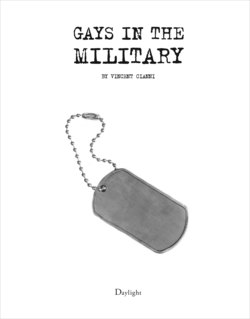Читать книгу Gays In The Military - Vincent Cianni - Страница 6
На сайте Литреса книга снята с продажи.
ОглавлениеSILENT,CELIBATE, AND INVISIBLE
Alan M. Steinman, MD
I served our nation proudly for twenty-five years in the U.S. Public Health Service and U.S. Coast Guard. For nearly all of that time, I was a medical officer in the Coast Guard, ultimately achieving the rank of rear admiral and serving as the Coast Guard’s director of health and safety. During that entire period, I remained “in the closet”; I did not reveal my sexual orientation to anyone in the Coast Guard, nor even to my family. But I was not alone in suffering the indignities of hiding my true self. Hundreds of thousands of gay and lesbian service members over the years shared with me the constraints the military imposed upon us in order to serve our country. In this book, the reader will meet some of those patriotic Americans.
The effects of the laws and policies banning gays and lesbians from serving in the military were deliberately draconian. They could not have a family; they could not share their lives with loved ones; and they were denied the opportunity to enjoy all the rights and privileges taken for granted by their heterosexual counterparts. Even though they put their lives on the line just as did their straight peers, the law required them to be silent, celibate, and invisible. Although they performed the same duties and shared the same risks, they could not be honest with their peers or with their commands. They could not honestly seek medical or spiritual counseling for their emotional problems. They were forced to violate the very precepts of integrity and honor that comprised the core principles of each of their services’ code of behavior, instilled in them from the instant they joined the military. And finally, they had to constantly live in fear that at any time, someone might find out who they really were and cause their discharge from the military, terminating their career. This meant that every telephone call, every e-mail, every photograph of a loved one, every casual conversation about what they did in their off-duty time or in their private lives had to be severely guarded lest the wrong person discover their hidden truth.
When Don’t Ask, Don’t Tell (DADT) was enacted into law in 1993, it was founded on the assumption that there exists in the military sufficient antipathy toward homosexuals that the mere knowledge of the presence of a gay, lesbian, or bisexual service member would degrade unit morale, unit cohesion, and combat readiness. This assumption was never supported by either academic study or objective data. On the contrary, a 1993 Department of Defense–sponsored study from the Rand Corporation found that allowing gays and lesbians to serve openly would not likely result in deleterious consequences: Despite these findings, Congress passed the DADT law and put into place a dark chapter in our nation’s civil rights history.
Over the years that DADT stayed in effect, an entirely unanticipated development gradually gained force: gay and lesbian men and women began to come out to their peers, and it wasn’t proving to be a problem for unit morale, unit cohesion, or combat readiness. By 2005, so many known gays and lesbians were serving that a Zogby International poll of Iraq and Afghanistan war veterans found that an overwhelming majority said they had no problem working with their gay and lesbian peers. By 2010, the number of known gays and lesbians became such a force that the Department of Defense’s Comprehensive Review Working Group (evaluating the potential impact of repealing the DADT law) concluded that gays and lesbians could serve openly without compromising military morale or operational effectiveness. This finding was dramatically exemplified in the following statement by a Special Forces warrior, highlighted in the Department of Defense study and repeated by President Obama at the 2011 signing ceremony repealing the DADT law: “We had a gay guy in our unit. He was big, he was mean, and he killed lots of bad guys. Nobody cared that he was gay.” The increasing visibility of gay and lesbian warriors in the nation’s military without any negative consequences was the single most important reason that DADT was finally repealed. Vincent Cianni’s photographic essay on gays in the military contributed to the recognition that real people with valuable skills and experience—indistinguishable from their straight counterparts and not some stereotype gay bogeyman—comprise those serving on active duty and in the reserves. This book will thus take its place among the documentary evidence of a significant milestone in our nation’s military history: equality for gays and lesbians in the nation’s armed forces.
